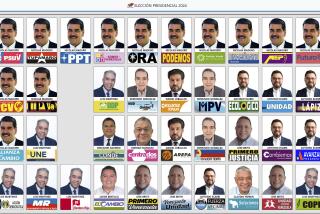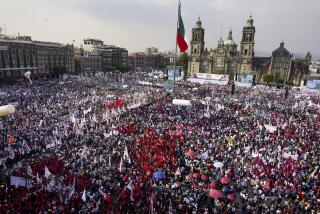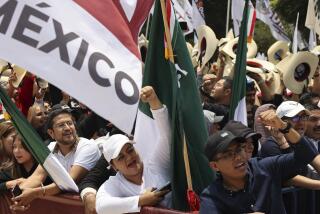Candidate for Dictator
- Share via
To no one’s surprise, Chile’s strongman, Gen. Augusto Pinochet, has prodded his fellow military commanders into nominating him as the sole presidential candidate in a plebiscite that will determine who will lead Chile until 1997.
Pinochet has already ruled longer than any leader since the country won independence from Spain--since a dark September day in 1973 when Chile’s last elected president, Salvador Allende, was overthrown and died in a bloody military coup. Fifteen years in power have not satisfied the imperious 72-year-old general. Pinochet is reported to even believe that God intends for him to rule Chile, which is why he survived an assassination attempt two years ago.
Regardless of any signs that Pinochet thinks he receives from on high, Chileans appear less than enthusiastic about the prospect of another eight years of his rigid military rule. Opinion polls indicate that the vote in the plebiscite, which is likely to be held in October, could be close.
The plebiscite will be held under a constitution that was approved by Chilean voters in 1980 amid charges of fraud. Voters will be asked to vote yes or no on Pinochet’s candidacy. If the yes votes prevail, Pinochet will win an eight-year term as president. If the no votes win, he will remain as the head of state for one year while preparations are made for another presidential election, late in 1989, in which various candidates could run for office. But even if a no vote leads to a new president’s taking office in 1990, Pinochet would retain considerable power by remaining as the head of the armed forces.
Technically Chile has been ruled by a four-man military junta--made up of the army, navy and air force commanders and the head of the national police--since the 1973 coup. But army commander Pinochet has been the first-among-equals since 1974. That is why Tuesday’s decision was not unexpected. Although other junta members had privately expressed the hope that another candidate for president could be selected, preferably a conservative civilian, Pinochet has been campaigning across the country like a candidate since last year, using his control over the nation’s broadcasting media as his main tool.
Pinochet has been warning Chileans that a no vote in the plebiscite would mean a return to the economic chaos and political turmoil that they knew under Allende and the other civilian presidents that preceded him. He aims to rekindle the middle-class support that existed for the junta in its early years in power. That support faded as Chile’s economy, like many others in Latin America, faced severe downturns in the 1980s. When those economic problems led to public criticism and protests, Pinochet cracked down, as dictators are prone to do. That further alienated the middle class. But a recent upswing in Chile’s economy could work to Pinochet’s benefit.
The government’s control over radio and television, which are virtually the only means of mass communication in the many isolated areas of a long and rugged country, is another reason a Pinochet victory seems likely. Still, the public-opinion polls indicate that the vote is too close to call at this point, mainly because of a very large bloc of undecided voters. Some analysts believe that these undecided voters reflect the fearful mind-set of a people who, after 15 years of often brutally repressive dictatorship, are afraid to express opinions even in private. It is distressing to reflect that Pinochet could have done that kind of damage to a nation that once had a proud tradition of open participatory democracy. On the brighter side, a remarkable 90% of eligible Chileans have registered to vote in the plebiscite. If enough of them remember Chile’s traditions, they may use the opportunity of the plebiscite to reject the dictator.
More to Read
Sign up for Essential California
The most important California stories and recommendations in your inbox every morning.
You may occasionally receive promotional content from the Los Angeles Times.













